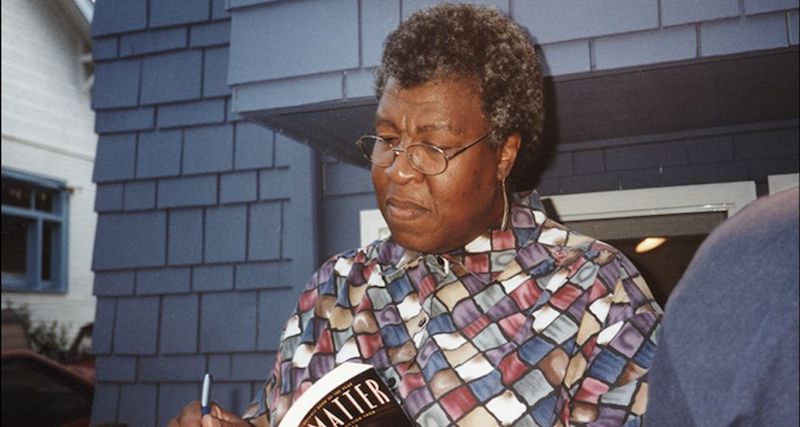On this day in 1947, the groundbreaking writer Octavia E. Butler was born in Pasadena, California. At age 48, Butler was the first sci-fi writer to receive the MacArthur Fellowship. Butler’s work explored issues that still impact society, such as capitalism, racism, sexism, classism, xenophobia, climate change, and religion. Her seminal novel Kindred (1979) follows Dana, a young Black woman who is suddenly transported from 1970s California to the Antebellum South. Today, Butler’s talent is not only viewed as undisputed but proof of a visionary mind. Some critics and fans cite her two-book series Parable of the Sower (1993) and the Nebula Award-winning Parable of the Talents (1998) as predictive of Donald Trump’s election and the rise in white nationalism.
Throughout her literary career, Butler offered glimpses into her creative process. Her writing advice can serve as a timeless touchstone for emerging authors and literary veterans alike. The collection below is by no means an exhaustive list but showcases some of her best advice.
*
On the nature of inspiration: “First forget inspiration. Habit is more dependable. Habit will sustain you whether you’re inspired or not. Habit will help you finish and polish your stories. Inspiration won’t. Habit is persistence in practice.”
On the mental stamina needed for a literary life: “I tell the students that there comes a time when you want to either burn it or flush it. But if you keep going, you know, that’s what makes you a writer instead of an ‘I wish I was a writer.’”
On writer’s block: “To me, writer’s block doesn’t mean that I can’t write—it just means that what I’m writing is not worth anything and that writing it is difficult and unpleasant.”
On becoming a writer: “I recommend that they [aspiring writers] take classes because it’s a great way to rent an audience and make sure you’re communicating what you think you’re communicating, which is not always the case, and I recommend that they forget a couple of things. Forget about talent. I recommend that they go to the bestselling lists and see who else doesn’t have talent and it hasn’t stopped them, so don’t worry. Forget about inspiration, because it’s more likely to be a reason not to write, as in, ‘I can’t write today because I’m not inspired.’ I tell them I used to live next to my landlady and I told everybody she inspired me. And the most valuable characteristic any would-be writer can possibly have is persistence. Just keep at it, keep learning your craft and keep trying.”
On genre: “What I usually say is that I don’t worry about the genre. It’s a marketing device and I let other people worry about that.”
On workshops: “Writers classes and workshops are good because they give you a kind of rented audience. They interpret your work back to you, and you can see if you’re communicating what you think you are.”
On making outlines: “If you can outline, you should—it helps you to know step by step if you’re going to get where you’re going and how you’ll get there.”
On the mechanics of the writing process: “You should always be able to summarize your story in one good, strong active sentence. I’ll use an example from my own writing: ‘Kindred is the story of a Black woman who goes back in time to the antebellum South and has to struggle to survive slavery.’ It tells you who the character is, it tells you what her struggle was, and it tells you in fact that she does survive.”
On rejection: “You need to go through that, and you never really stop going through that, even though you’ve learned to write professionally; you go on learning. If you don’t go on learning, then your writing becomes stale, and you do the same thing over and over again.”
On hopeful high school students: ”I’ve talked to high school kids who are thinking about trying to become a writer and asking ‘What should I major in?’, and I tell them, ‘History. Anthropology. Something where you get to know the human species a little better, as opposed to something where you learn to arrange words.’ I don’t know whether that’s good advice or not, but it feels right to me. You don’t start out writing good stuff. You start out writing crap and thinking it’s good stuff, and then gradually you get better at it.”
On people who suffer from writer’s block and the importance of persistence: “Keep writing. Keep writing. It’s the old idea that behavior that gets rewarded tends to get repeated. If you stop writing, then you’re kind of rewarding yourself with not writing. If you keep writing, after a while your brain maybe gets the idea. I’m not sure I said that very clearly, but I hope you know what I mean. Just that if you are a writer, you can’t stop writing. I used to have a teacher who said, ‘If anything can prevent you being a writer, don’t be one.’”
On advice for young writers: “The first, of course, is to read. It’s surprising how many people think they want to be writers but they don’t really like to read books… And the second is to write, every day, whether you like it or not. Screw inspiration. The third is to forget about talent, whether or not you have any. Because it doesn’t really matter.”
